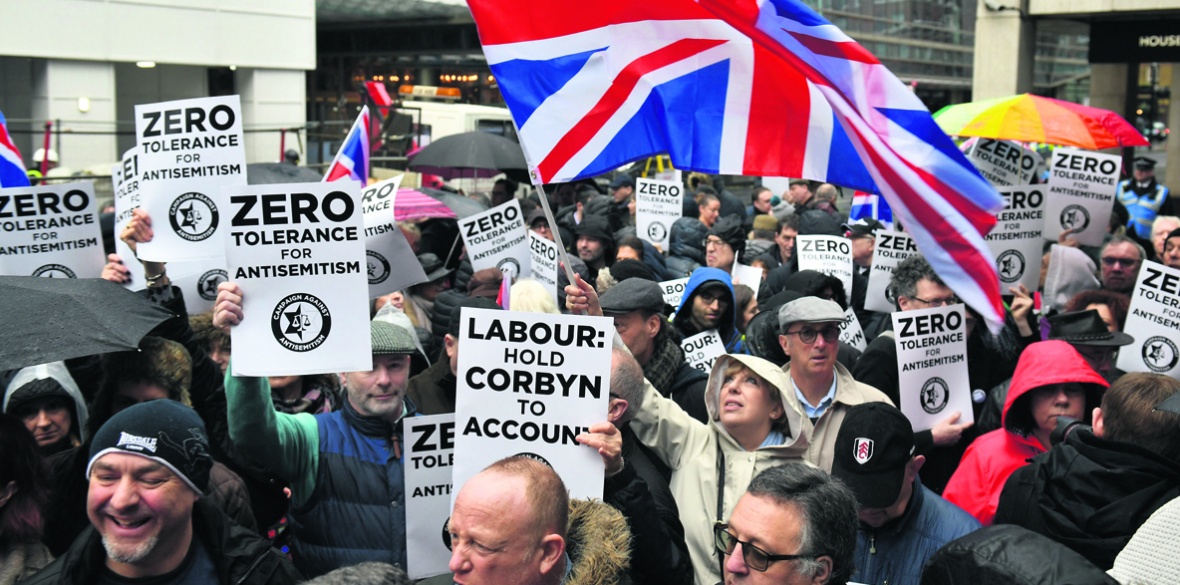This is the last article you can read this month
You can read more article this month
You can read more articles this month
Sorry your limit is up for this month
Reset on:
Please help support the Morning Star by subscribing here
IN November 2019 Verso Books published the free e-book Antisemitism and the Labour Party, edited by Jamie Stern-Weiner, an Israeli-born, London-raised DPhil candidate in area studies at the University of Oxford.
Ian Sinclair (IS): What is your assessment of the anti-semitism controversy that has engulfed Jeremy Corbyn’s Labour Party since 2015?
Jamie Stern-Weiner (JSW): Over the past two decades, whenever Israel’s grotesque human rights violations aroused popular indignation in the UK, Israel’s supporters depicted this reaction as a “new anti-semitism.”
The propaganda offensive against Labour that began in 2016 formed a novel variant of this strategy — a new “new anti-semitism.”
Whereas previous such controversies saw Jewish and pro-Israel networks mobilise against Palestine solidarity activists, the post-2015 campaign saw allegations of anti-semitism instrumentalised by the full breadth of the British elite in order to delegitimise, demoralise and ultimately demobilise the Corbyn movement.
The smear campaign was pushed by three distinct but overlapping networks: the Conservative Party, the Labour right and the pro-Israel Jewish establishment in Britain.
Each played an indispensable role. Tory and Labour right anti-semitism allegations would have lacked plausibility without the validation of Jewish leadership groups, which also mobilised their considerable organisational resources behind the campaign.
Conversely, the Jewish establishment’s vendetta against the left would have gained little traction had it not been amplified by other political and media elites.
The allegations against Labour are groundless. Jeremy Corbyn is not an anti-semite but among our most dedicated anti-racist politicians, while no persuasive evidence has been presented to show that anti-semitism in Labour increased or became widespread under his leadership.
Surveys indicate that anti-Jewish prejudices are less prevalent on the left than on the right of British politics, while a recent study commissioned (and then misrepresented) by the Campaign Against Antisemitism found traditional “anti-Jewish” stereotypes to be disproportionately concentrated among Conservative voters and supporters of Boris Johnson.
Even as the “Labour anti-semitism” inquisitors spent years combing through party members’ social media histories for incriminating material, the proportion of Labour members accused of expressing anti-Jewish prejudice rounds to literally zero.
The direct electoral impact of the anti-semitism smear campaign appears to have been slight. Its indirect contribution to Labour’s defeat was likely more significant: the leadership’s vacillating and defensive response to anti-semitism allegations made it look weak — a perception that ranked among the most widely cited reasons for Corbyn’s unpopularity; scarce leadership office resources were expended on constant media firefighting; and grassroots enthusiasm was enervated by the failure of any senior party or media figure to defend activists from the sweeping accusations against them.
IS: What has been the media’s role in all of this?
JSW: The British press is disproportionately sensitive to elite opinion and is itself part of the political establishment.
Intense media hostility to the Corbyn project was therefore inevitable. Already in 2015, the Media Reform Coalition described how “the press set out to systematically undermine Jeremy Corbyn … with a barrage of overwhelmingly negative coverage.”
A London School of Economics study the following year found “most newspapers systematically vilifying the leader of the biggest opposition party.”
And during the 2019 election campaign, research from Loughborough University indicated that newspaper coverage was overwhelmingly biased against Labour.
The “Labour anti-semitism” controversy was the most extreme and protracted manifestation of this vilification campaign.
Reporting was replete with factual errors. Rational criteria for assessing newsworthiness were abandoned, to the extent that random Facebook posts by ordinary Labour Party members and factional wranglings over the efficiency of internal Labour Party complaints procedures became headline material.
No effort was made to set the allegations against Labour within a broader context, either politically or in terms of what is known about the distribution of racism and prejudice in contemporary Britain. And information which undermined the claims against Labour was effectively suppressed.
More fundamentally, no mainstream reporter ever investigated whether the allegations against Labour were true.
Where journalists did not reflexively endorse the accusations against Labour, they were content to uncritically relay them alongside the party’s response.
Accusations by Jewish communal figures or anti-Corbyn MPs were considered inherently significant, whether or not they were accompanied by supporting evidence.
At the same time, individuals and entities that led the charge against Labour were not themselves scrutinised as political actors, despite the manifestly partisan aspect of the campaign.
The result was to grossly misrepresent the reality of anti-semitism in Labour and the UK as a whole.
For example, whereas it was widely reported that the 2017 Labour Party conference played host to numerous instances of anti-semitism, none of the concrete allegations withstood investigation, while nearly all turned out to implicate people who were themselves Jewish.
Perhaps more importantly, the disproportionate attention given the “Labour anti-semitism” story, combined with the failure to situate it within any broader statistical or political context, wildly distorted the scale of the phenomenon.
Respondents to a 2019 survey estimated that over a third of Labour members had been subject to an anti-semitism-related complaint; the real figure was less than one-tenth of 1 per cent. It is difficult to conceive a more damning indictment of British journalism.
IS: There seems to be a broad consensus that the Labour leadership and the Labour Party handled the anti-semitism controversy badly. Do you think they should have responded differently?
JSW: “Labour anti-semitism” was never a grievance amenable to resolution through reasonable compromise, but rather the pretext for a campaign to overthrow Corbyn’s leadership and demobilise his base.
It follows that nothing Labour might have done, short of total capitulation, could have prevented or moderated the media campaign against it.
It also follows that the strategy of compromise and appeasement was a mistake. None of Labour’s many concessions silenced its critics for even a millisecond.
But they did divide supporters, strengthen the other side’s position and make the leadership appear feeble.
Every time a senior Labour figure apologised for the party’s anti-semitism problem, they merely validated unsupported claims that such a problem existed.
The party’s adoption of the International Holocaust Remembrance Alliance definition of anti-semitism did not win the leadership any support but did hand its enemies an additional weapon with which to smear and drive out Corbyn’s supporters.
In the course of its misguided attempt to appease unappeasable critics, the party betrayed its libertarian heritage and instituted a regime of censorship.
The provision in the Code of Conduct which provided that the party’s disciplinary body “shall not have regard to the mere holding or expression of beliefs and opinions” was nullified.
And whereas the Chakrabarti report of June 2016 urged a moratorium on trawling members’ social media archives for offensive posts, December 2019 found Labour’s general secretary boasting about the party’s use of algorithms to sift the online histories of not just members but potential members to “detect patterns of behaviour.”
What else could have been done? Any response should have aimed not at ending the defamation campaign but at minimising the internal divisions it provoked and the resources it consumed.
To these ends, the leadership should have forthrightly stated and held to its view that allegations of a Labour anti-semitism “crisis” lacked evidence; that Labour’s critics were acting in pursuit of a political agenda; and that Labour did not intend to use party resources to police the thoughts and utterances of its 500,000 members.
As Norman Finkelstein has suggested, Labour might have established a small rebuttal unit to respond to significant allegations.
Otherwise, each and every media story about “Labour anti-semitism” should have been met with the stock response: “The elected leadership of the Labour Party has made its views on this matter clear. Any information concerning individual misconduct should be referred to our disciplinary mechanism, where it will be dealt with according to our standard procedures. We have no further comment.”
Mere expression of an unpopular opinion should not have been considered legitimate grounds for disciplinary action.
And complaints statistics should have been released on a routine basis with as much transparency as possible.
Whether the party leadership had sufficient internal leeway to implement a response along these lines, I do not know.
But had such an approach been pursued from the outset, it would have equipped members with a consistent and defensible line, minimised consequential internal divisions, reduced the time and money wasted on this non-issue, and — at minimum — avoided the leadership appearing unprincipled and indecisive before the wider public.
Antisemitism and the Labour Party is available as a free download from Verso Books mstar.link/AntisemitismLabourBook.










